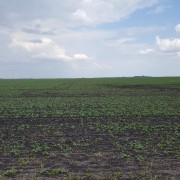Commitment
Knowledge is recognizing that a tomato is a fruit.
Wisdom is not putting it in a fruit salad.
A fellow farm advisor called me last week to ask for my opinion. The scenario illustrated a farmer’s plight of whether to seed or not to seed.
More specifically, this 1,800 acre farmer, a bachelor nearing 60, had put together a 5-year plan before the 2011 crop to retire from farming after 2015. After the 2015 crop, a review of his plan indicated he would have yielded a comfortable $400,000 after total farm dispersal. For a guy with no family and a willingness to drive someone else’s tractor in the busy season, that’s not terribly bad.
Despite a plan being in place, despite a nice tidy sum to live on from the sale of farm assets, despite being at the brink of achieving his own stated goal, he felt he wasn’t sure if he could actually retire. So he put in another crop for 2016.
Now in early May 2017, after poor yields and quality on what he actually could harvest, with about 300 acres left to harvest before 2017 seeding can even begin, as the bank is not prepared to extend further operating credit, my colleague asked the farmer, “Do you even want to put in a crop in 2017?”
Let’s summarize:
- About 16% of last year’s harvest is still in the field as of May 10;
- What crop did come off was poor quality;
- There are 1st and 2nd mortgages on owned farm property;
- Working capital is virtually non-existent;
- Operating credit has been denied.
Even if this farmer wants to seed a crop in 2017, I don’to see how he will be able to.
What to do?
To Plan for Prosperity
Why did this farmer not stick to the plan he initiated and helped build, that plan that would have left him in a reasonably comfortable spot? Did he review it over those 5 years? Was it adjusted? What changed?
It’s likely that he made the plan at the urging of his advisor, and that he himself was never really committed to it. If that is the case, then the effort, the document, and the strategy are about as valuable as durum with 20% fusarium…throw in all in a pile and burn it.
Collectively, farm advisors have been clamoring for years for farmers to put more effort into planning. Yet without commitment to act on the plan (for whatever the excuse,) any plan is absolutely worthless. It is, in effect, the same as not planning at all, except that we can pat ourselves on the back because we “made a plan.”
No one makes a crop plan then does not act on it. Why does the financial, transition, management, or capital expenditure plans not get the same commitment?
The plan exposes and elevates the knowledge, but it’s the wisdom to act that makes it valuable.












Leave a Reply
Want to join the discussion?Feel free to contribute!